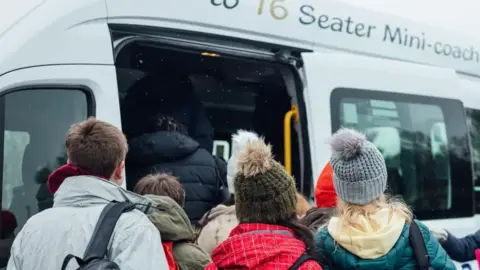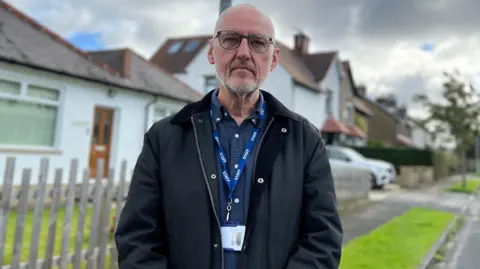Changes to transport for SEND children approved
 Getty Images
Getty ImagesChanges to school transport for children with special educational needs (SEND) have been approved despite fears they could place a "financial burden" on families.
Bradford Council officials have signed off on proposals to scrap the subsidy for post-16 students and replace it with a one-off flat fee payment linked to the distance they travel to school or college.
The authority said the new system would be more "cost-effective" and save £300,000, but there are fears some children would have to change schools.
Geoff Winnard, chair of the council's cross-party children's services scrutiny panel, warned that many families would suffer a "considerable loss" financially and that working parents could struggle to make different arrangements.
 Aisha Iqbal/BBC
Aisha Iqbal/BBCUnder the current system, the council fully subsidised home to school transport, including taxis, but this was described as offering limited flexibility.
From April, students will receive an annual grant based on the distance they travel, up to £3,000. Families would make their own arrangements and pay any difference themselves.
There are currently 322 children who receive help with SEND transport at a yearly cost of £1.7m. The current maximum annual contribution by parents is £370.
The council said the most vulnerable children would still have their travel arranged by the authority.
A report ahead of the decision said: "The allowances could place additional financial burden on families, particularly those on low incomes or those that need to travel furthest to access a suitable educational provision.
"We will mitigate the financial implications by directing families and students to other sources of financial assistance, such as bursaries or support provided by post-16 schools/colleges".
The report also acknowledged that some families may have to make "different" choices regarding the post-16 education provider they attended.
Marium Haque, the council's director of children's services, told a meeting of the executive on Tuesday that there had been "concerns and questions asked" by those with children with the most complex needs.
She added: "This is about supporting people to be as independent as possible. With young people requiring taxis and escorts, they will have their needs assessed, and as their needs increase or decrease, their support will be adjusted accordingly."
The new policy would also bring Bradford in line with other local authorities.
Winnard said many families' current arrangements cost more than the £3,000 maximum allowance and that children with additional needs often had to travel longer distances to access suitable educational settings.
He added: "For some people who require taxi-type services with escorts, that is going to be a considerable drop in support. We also have to appreciate the impact on working parents, as just suddenly expecting them to accompany their children may not always be realistic or practical."
Follow BBC Yorkshire on Facebook, X (formerly Twitter) and Instagram. Send your story ideas to [email protected].
